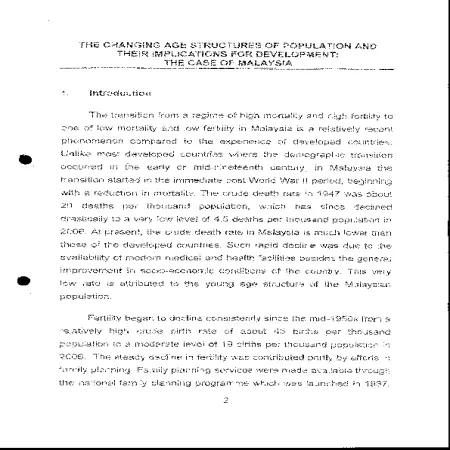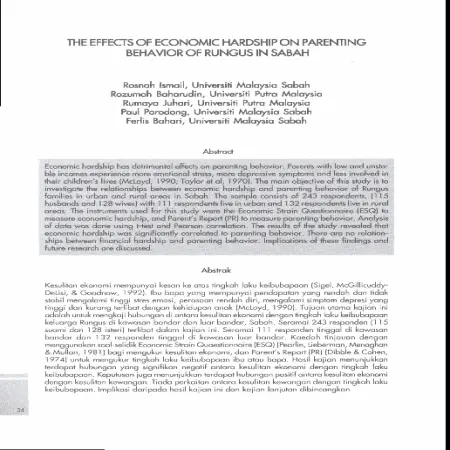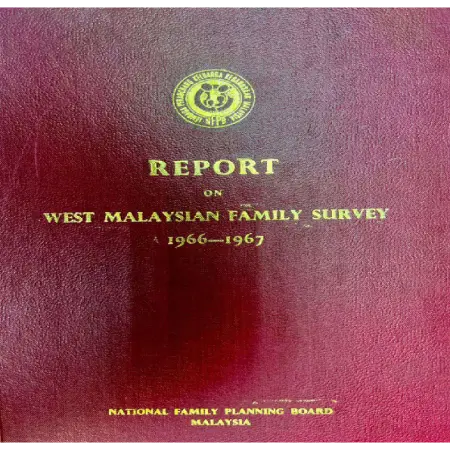Browse by Subject
Results for Search : "305 Social groups"
|
|
The prevalence of work-family conflict among mothers in Peninsular Malaysia
Item Type: Article
Editor:
Year: 00/11/2011
Abstract: Achieving work-family balance is dependent on managing the conflict between work and family roles. This study focuses on the prevalence of work-family conflict among mothers in Peninsular Malaysia. The objective of this study is to examine the relationship between perceived work-family conflict and socio-demographic and family characteristics of the mothers. Data were obtained from 801 currently working mothers (with at least having one child) who were between 15 and 49 years old in Peninsular Malaysia interviewed in the Fourth Malaysian Population and Family Survey (MPFS-4), 2004. The result of this study showed that ethnicity, age and employment are the main factors contributing to the prevalence of work-family conflict. However, there is no significant relationship between the prevalence of conflict and the studied family characteristics, namely, number of children, childcare arrangement and presence of children aged 7 to 24 years.
|
|
|
|
|
|
The 4th East Asia Ministerial Forum on Families, "safe and resilient families: protecting and empowering at-risk and high risk families", Kuala Lumpur, 7-10 November 2010
Item Type: Country Statement
Editor:
Year: 00/11/2010
Abstract: A family is a living, evolving institution, affected by socio-economic factors as well as by the changes that shape the social environment in which it functions. More often, the changes and transformations have brought both gains and losses to family institutions. Hence, the challenge today is to reinforce positive changes and secure those in the new environment, and at the same time, to mitigate the negative consequences of changes, without dampening the momentum for positive evolution.
|
|
|
|
|
|
The 3rd East Asia Ministerial Forum on Families, "Strengthening family resilience: moving from policy to action",Bali Indonesia ,17-19 November 2008
Item Type: Country Statement
Editor:
Year: 00/11/2008
Abstract: The family institution performs multifaceted functions in the development and well-being of its members. In order to enable the family institution to fulfill its societal roles and responsibilities, it requires support from the state, civil society and from family members themselves. In this regard, it is essential that we examine
social services policies from the family and not just from the individual
perspective and whether they contribute towards the strengthening of
family resilience. Effective support and protection to families and their
individual members requires that services respond appropriately to the
needs that exist at different stages of the family lifecycle and the individual
lifespan.
|
|
|
|
|
|
The changing age structures of population and their implications for development: the case of Malaysia
Item Type: Conference or Workshop Item
Editor:
Year: 00/00/2008
Abstract: The transition from a regime of high mortality and high fertility to one of low mortality and low fertility in Malaysia is a relative recent phenomenon compared to the experience of developed countries. Unlike most developed countries where the demographic transition occurred in the early or mid-nineteenth century, in Malaysia the transition started in the immediate post World War II period, beginning with a reduction in mortality. The crude death rate in 1947 was about 20 deaths per thousand population, which has since declined drastically to a very low level of 4.5 deaths per thousand population in 2006. At present, the crude death rate in Malaysia is much lower than those of the developed countries. Such rapid decline was due to the availability of modern medical and health facilities besides the general improvement in socio-economic conditions of the country. This very low rate is attributed to the young age structure of the Malaysian population.
|
|
|
|
|
|
The effects of economic hardship on parenting behavior of Rungus in Sabah
Item Type: Article
Editor:
Year: 00/01/2004
Abstract: Economic hardship has detrimental effect on parenting behavior. Parents with low and unstable incomes experience more emotional stress, more depressive symptoms and less involved in the children's lives (McLoyd,1990;Taylor et al, 1970). The main objective of this study is to investigate the relationship between economic hardship and parenting behavior of Rungus families in urban and rural areas in Sabah. The sample consists of 243 respondents, (115 husbands and 128 wives) with 111 respondents live in urban and 132 respondents live in rural areas. The instrument used for this study were the Economic Strain Questionnaire (ESQ) to measure economic hardship, and Parent,s report (PR) to measure parenting behavior. Analysis of data was done using t-test and Pearson correlation. The result of the study revealed that economic hardship was significantly correlated to parenting behavior. There are no relationship between financial hardship and parenting behavior. Implications of these findings and future research are discussed.
|
|
|
|
|
|
The report on West Malaysian Family Survey 1966-1967
Item Type: Research Report
Editor:
Year: 00/01/1968
Abstract: The data presented in this report was collected under the Statistics Act, No 34, 1965 by the Department of Statistics. This report is the First Malaysia-Wide Family survey was conducted at the end of 1966 and the beginning of 1967 with the objective of the finding Knowledge, Attitude and Practice of the people in Family Planning.
|
|
|
|










